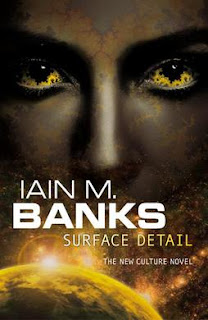I'm slowly but surely working my way through all the Culture books, using a time-honored "when I stumble across them in a shop" technique.
This was a bit more work to get through, for me, than many of Banks' other works. Sentence-by-sentence, still lots of fun—the more attentively I read Banks, the more wordplay and cleverness jumps out at me—and the big ideas are good. However, the multiplicity of plots and view-points is a little overwhelming; what initially seems like three storylines proliferates and multiplies, with each point-of-view getting only fairly short textual chunks at a time. The result is a kind of attenuated feeling; there's so much not immediately obvious in each storyline (standard for Banks) that I just got a kind of collage of events, with things not really lining up until the last fifth of the book or so, when Veppers' real motivations become clear.
To real it back for a second to synopsis, Surface Detail is a Culture story: broad galactic space opera. The Culture itself is a multi-species civilization run primarily by Minds, highly advanced and typically ship-born AI. As it's basically a post-scarcity, hedonistic, space socialist utopia, tension in the Culture comes from its interactions with other civilizations—lower-tech groups that it sometimes attempts benevolent interference with, equivalent-tech groups that are potential threats, and "Elder" or "Sublimed" species that typically don't participate in galactic life, but may have powers far in excess of the Culture if they decide to do so.
Saturday, February 2, 2019
Friday, January 22, 2016
Think Galactic- Stations of the Tide
For January's Think Galactic, we discussed Michael Swanwick's 1991 novel "Stations of the Tide".
The novel is set an indeterminate but considerable time in the future. Humans have colonized other solar systems, and our action mostly takes place in the Tidewater region of the planet Miranda, which is periodically flooded. Our protagonist, a nameless bureaucrat, has been sent from the advanced space-borne societies to track down Gregorian, a Mirandan who may have stolen some dangerous replicating technology.
On one level, it's a straightforward science-fictional riff on the noirish detective tale, flavored with some bureaucratic spook business. Despite its relative brevity, though (250ish pages), there's a surprising number of levels here, threads and allusions and alternate plot interpretations constantly seeping in.
So, as you can imagine, a nice discussion. Spoilers below!
The novel is set an indeterminate but considerable time in the future. Humans have colonized other solar systems, and our action mostly takes place in the Tidewater region of the planet Miranda, which is periodically flooded. Our protagonist, a nameless bureaucrat, has been sent from the advanced space-borne societies to track down Gregorian, a Mirandan who may have stolen some dangerous replicating technology.
On one level, it's a straightforward science-fictional riff on the noirish detective tale, flavored with some bureaucratic spook business. Despite its relative brevity, though (250ish pages), there's a surprising number of levels here, threads and allusions and alternate plot interpretations constantly seeping in.
So, as you can imagine, a nice discussion. Spoilers below!
Tuesday, March 3, 2015
Weird & Wonderful: Snow Crash
At last month's Weird & Wonderful discussion of Max Barry's "Lexicon" (2013), we decided we pretty much had to read Neal Stephenson's "Snow Crash" (1992): "Lexicon"'s core mechanic of neuro-linguistic hacking seems to be borrowed or at least inspired by "Snow Crash", or at any rate from similar sources.
Furthermore, "Snow Crash" is just delightful, really bonkers, and either the apotheosis of the cyberpunk movement or its satiric denouement, one really can't tell. The novel is laughably hard to summarize: the search for the cure to an ancient alien mega-virus that manifests in biological, linguistic/religious, and computerized forms, set in a tech-filled, corporate-franchised/libertarian-anarchic vision of America (and also an elaborate virtual world, the Metaverse), by a hacker-prince/master swordsman named Hiro Protagonist and a 15 year-old skateboard courier named Yours Truly, all of which packaged with a hundred or so pages of Sumerian mythology and a healthy dose of early Christian (alt-?) history; other key players include a mutant obsidian knife-wielding superman named Raven, the Mafia (and they're the good guys!), and a supersonic radioactive pit bull cyborg . Whew! If that doesn't sell you, I don't know what to say. Possible spoilers below!
Furthermore, "Snow Crash" is just delightful, really bonkers, and either the apotheosis of the cyberpunk movement or its satiric denouement, one really can't tell. The novel is laughably hard to summarize: the search for the cure to an ancient alien mega-virus that manifests in biological, linguistic/religious, and computerized forms, set in a tech-filled, corporate-franchised/libertarian-anarchic vision of America (and also an elaborate virtual world, the Metaverse), by a hacker-prince/master swordsman named Hiro Protagonist and a 15 year-old skateboard courier named Yours Truly, all of which packaged with a hundred or so pages of Sumerian mythology and a healthy dose of early Christian (alt-?) history; other key players include a mutant obsidian knife-wielding superman named Raven, the Mafia (and they're the good guys!), and a supersonic radioactive pit bull cyborg . Whew! If that doesn't sell you, I don't know what to say. Possible spoilers below!
Subscribe to:
Posts (Atom)


